Come one, come all to exotic Vietnam. the jewel of Southeast Asia. Meet interesting, stimulating people of an ancient culture—and kill them.
Gustav Hasford.
When statesmen gravely say, “We must be realistic,”
The chances are they’re weak and therefore pacifistic:
But when they speak of principles—look out—perhaps
Their generals are already poring over maps.
“Statesmen” by W. H. Auden
After landing back in The Lucky Country, I spent a few days in the Harbour City. I read that in my absence, Sydney had played host to the Prime Minister of South Vietnam. On January 21, 1967 Australians were able to see a leader of the country we were fighting in, coming to bolster that support. Details of his motorcade’s route from the airport through the city and on to the Australian Prime Ministers office residence, Kirribilli House had been supplied in the media. What wasn’t broadcast were details of the unofficial welcoming party organized to protest against the extensive remorseless bombing and defoliation of his country.
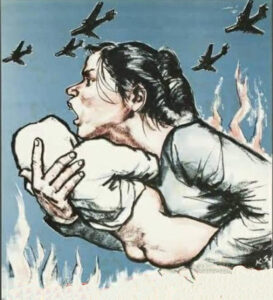
I found posters stuck up around the city on lamp posts appealing for support for the protest and I responded. I was weeks too late to attend but wanted to find out how it went. That’s how I came to meet Bob Gould-‘Bookshop Bob’. After phoning the contact number, he suggested I could meet him at the city shop he was working at when his shift started.
While waiting, I became totally absorbed reading magazines. Wanting to move me on, The floor manager told me, ‘this is not a library!’
‘OK! I will talk loud, then!’ I said reaching a crescendo, ‘I’m looking for one of your staff.’
‘Does this look like a dating service?’
As soon as Bob appeared, I recognized him. ‘You were the arboreal activist at the demo against Johnson. Up there belling the cat. ’
‘Guilty as charged’, he said. ‘What are you looking for?’
I wanted to know what the most forthright books on the war against Vietnam are, books with spine,and what is happening with the protest movement.
‘That would take a long time, ’he said, looking over his shoulder. He obviously knew what he was selling and I found out in half a tick he could turn up almost anything you asked for. However I could see he didn’t want to be caught talking unduly to customers who weren’t, in the manager’s eyes, coughing up big enough.
A man came up to him and asked for a book about turtles. Bob asked: ‘Hardback?’
She was like: ‘Yes, and little heads. ’
‘You need our Animals and Nature section, Sir. Just around the corner to your left.’
‘Do you have any books about anti-gravity?’ asked a young boffin.
‘As a matter of fact we do in the Science section. We have one in particular which is very popular. It’s readers find it so interesting, it’s hard to put down.’
‘What about books on spectrographs? ‘
They would be too specialised and serious for our readership. They sound like some heavy reading.’
‘On the contrary, they’re good for light reading.’
Another customer asked, ‘Do you have any books on Pavlovian Conditioning?’
Without reflecting even for a second Bob automatically pointed to the psychology section behind the customer.
‘I guess that’s where I’d find something on motivation.’
Why would anyone need to read about that? What’s the big mystery? It’s a fairly simple thing. Either you want to do something or you don’t. If you’re motivated enough to look for books on motivation, can’t you be motivated to work it out for yourself? You don’t need such a book.’
‘What about books on paranoia?’
Bob replied, ‘They’re right behind you!’
‘Are they selling well?’
‘Better watch out. They’re flying off the shelves.’
‘What about books on Stockholm Syndrome?’
‘There’s one on the same shelf. It starts off badly but by the end you’ll really like it.’
My sixth sense told me Bob didn’t care who or what was behind him. It told me that his heart didn’t lay in the commercial world. As we were talking a lady customer came up to Bob and and asked him, ‘Where’s the self-help section?’
‘You’ll just have to work that out for yourself, Madam. ’
When she went off searching, noting my quizzical look, he explained his unaccommodating reply: ‘If I had told her, it would have defeated the purpose. As for your’s, you could always come along with me after work and find out more. I’m going to North Sydney later this afternoon. Why don’t you come along with me? I have to pick up from a deceased estate some books that were auctioned. You might help me carry them back. On the way I could tell you what gives with the Vietnam Action Campaign. ’
After alighting from the ferry later that day , we walked underneath the northern arches of the Sydney Harbour Bridge. Bob recounted to me the events of that on that sticky sweltering day in January.
‘ It was here that dog day afternoon we gathered to holler for the Marshall. I found me joining several thousand of us gathered on yet another demo, sweating it out to show our opposition to the scungy, stinking policy this dog of war took responsibility for.
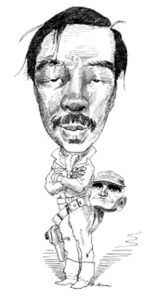
What I remember most, however, is the righteous anger that those thousands of demonstrators felt against it. We were flanked by the tightest, tough as nails detachment of police officers I had ever clapped eyes on. We were addressed by Arthur Calwell. ’
That would have to have been his last hurrah. He’s been on the skids since Labour’s trouncing in the khaki election. How’s the old battler shaping up?’
‘Well, he looks and sound substantially older than his 70 years. He’s aged rapidly, dragging the A. L. P. kicking and screaming into opposition to the war. But he’s certainly not going without giving his adversaries a good tongue lashing. In an emotional speech, Arthur spoke in no uncertain terms about his contempt for the dictator. ’
‘Ky notoriously expressed his admiration for Hitler, I believe. ’
‘And here our City Fathers were offering him the keys of the city. The least we could do was to try and change the locks. ’
‘Ky wished Vietnam had four or five of Hitlers to sort things out. This was hugely embarrassing for Johnson. ’
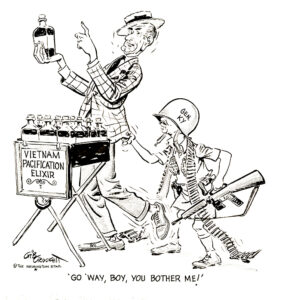
“Butcher, moral and social leper, little Quisling gangster”, Arthur raged as he did against the foreign intervention. “Out of Vietnam!” he insisted. A lone surfer echoed this view, paddling into view on his board. Pursued around the bay by the Water Police, he led them a merry chase till they hauled him and his placard onto their launch. ’
‘I hope he got his mini manifesto across.
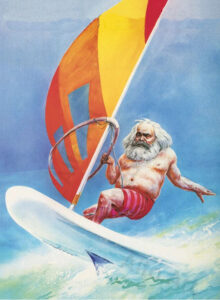
How did the demo proceed?’
‘At first our gathering elected to head towards Kirribilli House determined to give the Marshal and his protectors a piece of our mind close up. ’
‘What about Tom Uren. What was his role?’
‘Tom played a pivotal moderating role, moving that to confront the police even non violently could play into their hands. He was seconded by the sun which every minute was beating down ever more fiercely. We agreed to disperse. As it turned out the authorities weren’t taking chances on any encounters that weren’t stage-managed in their favour. A last minute change of plan saw the visitors’ motorcade disembark at Circular Quay, proceeding over the harbour by boat rather than the bridge, thus sparing them the unceremonious reception we were offering. ’
‘At least you were recognized as a force. One to be reckoned with on that scorcher. ’
‘That wasn’t the cold comfort we were seeking. Cordoned off from the threshold of power, they made sure our words fell on deaf ears. It will take the sounds of many millions more to reach the desired crescendo. ’
‘What do we tell people who say, ‘We have so little power compared to this crushing steamroller. How can we stop it?’
‘We tell them resistance is like sabotaging any huge machine. A little sand in the gears will not stop it. But if more people throw a little more sand and gradually more, the motor begins to stutter until once and for all the assembly line stops. ’
‘What is the most important demand the movement should be making, Bob?I asked.
‘Thus far almost all of the nationally known critics of our Vietnam policy have been reluctant to call for a total hands off policy. Sometimes this is for substantive reasons. But often, I believe, it is because these critics consider stand down of troops and total military withdrawal, while logical and right, “too extreme” as a tactical position, and therefore unpalatable to the public and unlikely to be adopted as national policy. They argue this is unrealistic. Whitlam wants to ditch the ‘withdraw the troops’ line in favour of ‘withdraw to holding areas.’’ In effect this leaves one to work only among the alternatives which the big guns in society put forth. It is as if we are all confined to ‘a, b, c, or d’ in the multiple choice test, when we know there is another possible answer. The system sets limits beyond which prissy people are not supposed to think or speak. So far, too much of the debate on Vietnam has observed these limits. ’
‘ Machiavelli cautioned the prince, ’he added, ‘ not to adopt the ethics of the citizen. It is appropriate now to suggest to the Citizen that he cannot, without sacrificing both integrity and power, adopt the ethics of the Prince. ’
The Ky Factor.
Back in Armidale in 1967 for my last year of studies, I caught up with Lam and compared notes with him on the response of Ky’s visit.
“This visit was very successful”, he said, “That’s how it seemed to people in the know”, he said, referring to the media pundits. “Dressed to kill, squiring his beautiful wife, he made friends wherever he went. People lined the streets where his motorcade went along with placards welcoming him. He wasn’t afraid to plunge into the crowd and shake the hands of well-wishers. He looked like a sincere dignified leader”.
I found it hard to disagree with this impression. What a propaganda blitzkrieg. Thanks to the media this chain smoking dictator came across as a dashing action hero, adding his own puff to our troops training, clouded in smoke. The media did a great make up job. They focused on the glamour of him and his armpiece, each change of her wardrobe, analyzing her hairdos, even printing enlargements of her shoes.
‘Did you catch the scene where they were framed like film stars at the top of the plane’s stairs? The way the camera dwelt at length on the motorcade for a maximum impact. The upbeat music accompanying the motorcade footage. ’
‘Shades of Riefenstahl”, I said, explaining the role of Hitler’s cinematic propagandist.
“Do I detect a note of sour grapes, Allan. Do you resent the fact that our nation’s leader was presented in such a glowing light. Don’t you think Arthur Calwell appeared rude, without a civil tongue in his head?”
“With due respect to you, Lam, I see the leader of your country and mine being complicit in activity that is very bad and morally wrong. Measuring success by body count, the only glowing lights in my mind are the ones from burning craters and villages set on fire. As for all the smoke, that’s just a screen to hide what they’re really up to.
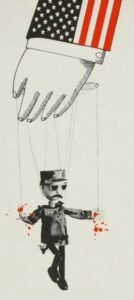
By the way, you’ll note, there was precious little footage shown of the hue and cry against the visit”.
What did get raised in the media was the furore in response to Arthur’s unbridled fusillade. It led to an unseemly dispute with the South Vietnamese Embassy which led to the visit being put across as a public relations contest between Marshal Ky and Arthur Calwell.
“Arthur might not be a lady killer, Lam”, I said using the term intriguingly applied to himself by Ky to distance himself from Hitler, “But looks shouldn’t be the issue here. Arthur is an old school politician who doesn’t mince his words – or his adversaries. He doesn’t have a. care for diplomatic niceties in this case. He’s taken a principled stand and that’s what I feel is the long and short of it. To stop this obscene war that is becoming so divisive”. To the point that Lam and I could only agree to disagree. I would see him around the college and campus, exchange greetings and ultimately lose contact. He had to keep his head down I know and I respected that. Looking online, it appears he is now an advisor to the Foundation for International Human Resources in Bangkok. I’d love to discuss with him the miracle of Vietnamese adaptability, that marvelled on by the Californian liquor dealer Nguyen Cas Ky on his controversial yet successful visit to the Socialist Republic of Vietnam.
The King And I.
On my return the Cambodian prince and head of state Norodom Sihanouk would thank me for my wishes and expression of friendship with his country. He wished me well in my studies and was touched by what I had to say to him. I expressed the wish that his country avoid the interference of other powers again and not be drawn into the war raging around.
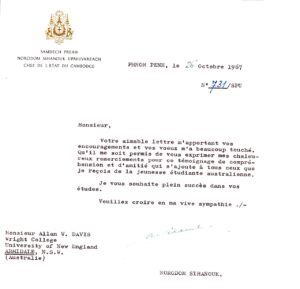
He was party to all the changes in Indochina. After being selected by the French as a singing ruler, dancing like a marionette, he saw their role as being to pull the strings. He resolved to take a more independent role. Cambodia would remain strictly neutral in the stand-off between the US and the USSR and between the US and China. As such he was an obstacle to the US who wanted to destroy the Ho Chi Minh trail shuttle. While on a flight to Moscow his government would be overthrown in a coup engineered by the US. The coast would be clear for the uninterrupted US carpet bombing of Cambodia with its massive loss of life and damage to property. With his country ensnared in the war, Sihanouk would react by forming an alliance with his former foes, the Khmer Rouge.
The Khmer Rouge were swept to power in the vacuum created by US bombing.
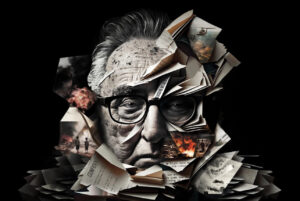
From a regional standpoint their Red Terror would follow close on the heels of the White Terror in Indonesia. U. S. recognition of the Khmer Rouge government in the United Nations would give it respectability and help them undermine the Vietnamese resistance.
The Home Front
On New Year’s Day, 1967, an explosion ripped through the Yugoslav Consulate in Sydney, the climax of a wave of attacks on Yugoslav property going back to 1963. I discussed these incidents with Russel Ward as we sat watching reports on the tube. ‘What with all our military preparation, how can the perpetrators get away with such dastardly acts?’, I asked.
“Allan’, he replied, ‘don’t get me started. Rather than go after those who carried this out, the state looks the other way.. It’s obsessed with Communist political terror , but ignores that from anti-Communists.
There can’t be any other explanation. Our ‘ intelligence’’ agency’, he sneered, holding up and bending two fingers on both hands, ‘ relaxed it’s monitoring of the post-war flood of immigrants. The word going the rounds is that it allowed Ustasha migrants to enter, form and train in holes and corners a pistol packing militia, Croatian Revolutionary Brotherhood, dedicated to an armed uprising against the Yugoslav state. It’s activities are discussed openly in the Croatian press. Other odious domestic spy operations include close co-operation with central and eastern European Nazi collaborators, including known mass killers. ’
‘How could such a situation have arisen, ’I asked.
‘On a smaller scale we Australians have gone through a version of McCarthyism paralleling that of the US. Sections of the establishment became alarmed after World War II. The Labour Party had brought about reforms to health insurance and free medicine. It attempted to nationalize the banks in 1949 and commit to full employment . Waiting in the wings for his time to dominate the political stage, Robert Menzies set out to hit this on the head. He knew how to tap into the fear of the Communist Party’.
Russel told me about this experience from his perspective. ‘While the Party was smaller than the ALP- its wartime height was 20, 000 members – many more had passed through its ranks. Most of us were idealists committed to the building of a more humane, just social and economic order. I joined when it was outlawed, driven underground by Menzies. Calling each other comrade, we savoured the spice of danger in this conspirational atmosphere. At the time it was the only Australian political party opposed to the White Australia policy.
‘What led you to reject this restrictive approach?’
‘It was Douglas Mawson, the professor of geology at Adelaide University and Antarctic explorer who made incandescently clear the poverty of this thinking. We asked him to address the arts students association about this. In this lecture, one they’re still talking about, he suggested simply that black, brownish-yellow and white people were equally human beings, very similar except for the pigmentation of their skins; further that these different skin colourings and body shapes were the result of an evolutionary process of natural selection, undergone for hundreds of thousands of years, by the ancestors of negroid, mongoloid and Caucasian peoples in respectively hot, temperate and cold natural environments. ’
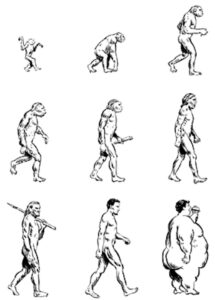
‘And by the ancestors of our primate cousins, the apes, which some still refuse to recognise.’
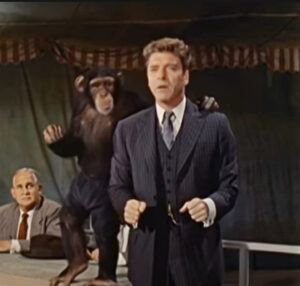
‘There’s still fierce opposition to the idea of evolution, isn’t there?’
‘Anyone who fails to see the evolutionary link between man and ape has never been in the toilet of a public school. ’
‘Who can be so blind not to see thes connections?’
‘It’s particularly the hardline religious powerbrokers. I discovered later when I was teaching first year secondary students, there was no textbook up to snuff. So I wrote ‘Man Makes History’ which sold well over the decades. But not until a certain hitch had been overcome. A certain Father Kelly, director of education for one of the dioceses had a bone to pick with me. He told my publisher that in my scientific account of human evolution there was no mention of Almighty God. He threatened to boycott the book and persuade hosts of teachers to follow his example.
‘How did you get around that?’ I asked.
‘I wrote to the venerable A. P. Elkin, Professor of Anthropology at the University of Sydney. As an ordained Anglican priest, Elkin kindly wrote a foreword certifying in effect that my little children’s book contained nothing repugnant to Christian faith or morals. I was commissioned to write the book for Frank Packer’s publishing house. I had encountered the press baron one day when I was walking with a teacher friend who did work for him, in the city. ’‘And now for the big question, Russel, ’ I said, revising that asked by army recruiters to emotionally blackmail non-combatants: ‘What did YOU do in the second Great War?’
‘Some 4000 members like myself served in the Australian military forces. Many wore decorations and honours. ‘But not me’, he hastened to add, seeing my eyes light up in adulation. ‘Mine was the most inglorious military career in Australian history, second only’, he quipped, ‘to that of Robert Menzies.
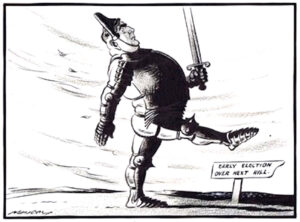
My body count was a standing joke: I killed as many of them as they did of me. I logged four years with the A. I. F. but never saw a bayonet bared with intent or a shot fired in anger. ’
Not even an odd, angry one?
‘None whatsoever. I served as a chocolate soldier’.
‘ Like the titular deserter in the Strauss operetta. He uses his ammunition pouch to carry chocolates to his lady and has no cartridges to load his weapon. ’‘Partly’, said Russel. ‘It also implied a uniformed man who melted under pressure. A pogue, a man like me in uniform who commuted to an office from the comfort of his home.
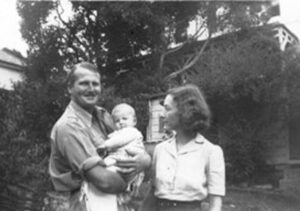
‘You didn’t think you had the makings of a good soldier?
‘Heroism? Well. That ruled me out. Self-sacrifice? Not your man.’
‘Didn’t they try to break you out of this attitude?’
My routine was broken only by the occasional display of drill. Such a man, it was believed would melt under pressure. ’
‘ As chocolate would in the sun, ’I suggested.
‘You took the words right out of my mouth, Allan. Now If I told you what my work involved, you wouldn’t believe me. ’
‘Well just try’, I replied.
‘Of all the clerically nasty things assigned me, I served on the home front initially as a censor in military intelligence, clad in a giggle suit, workaday uniforms so unshapely and hideous as to provoke snickers in the beholder. Reading private letters of soldiers fighting in the islands for the public good. ’
‘Was any of this correspondence of any relevance to the possible prosecution of the war?’ I asked.
‘I only brought one to the notice of my superiors. A scabrous epistle by a soldier expressing admiration for Hitler. Whatever the response to my passing this on, I’ll never know. What I do remember is the bookcase of the officer I was summoned to report to about the matter. Having kept me cooling my heels outside his office, presumably to impress me with the importance of his work, I had plenty of his own sweet time to browse the titles on the bookshelves. Of ‘Mein Kampf’ there was not a trace. Yet there dozens and dozens of socialist tracts enclosed by behind glass by two large barred doors with a massive padlock. To prevent contamination of simple minded people, I imagine. Seemingly for Australian military intelligence more than a year after the the German invasion of Russia your actual enemy was still communism, not fascism. I was later told some years later that my army file marked me down as a dangerous Communist : never to be sent to an operational area.”
After reading mail eight hours a day about the lives of others, I served elsewhere as a radar mechanic. Then as a sergeant in “the psycho-service” or “the giggle house,” the name given to the Australian psychology testing section.It liked to boast of it’s successes ‘.
‘Based on pulling rabbits out of hats?’
‘Based on pulling habits out of rats. We assessed military personnel and on this basis we recommended to the authorities the type of work and unit to which each soldier could be most suitably allocated. Of course there were those who wanted to get out of the army. They tried all ways to lead it on-making like they were knock kneed, sexually deviant or mentally impaired. ’
‘Like pretending they were transvestive?’
That’s one kind of pretence. One guy reported to the medical officer for inspection sporting lipstick, high heels and carrying a purse. ’
‘Did he escape military service?’
‘It couldn’t have worked out worse for him. The Army took him in and the doctor took him out. ’
‘I guess the army were watching out for signs of inappropriate social behaviour.’
One bloke had particular difficulty achieving intimacy with others.“I like to hold hands at the movies,’he revealed, ‘this always seems to startle strangers.
The first time I ever got undressed in front of a woman, it was horrible; she started screaming.That’s when they kicked me off the bus.’
‘I trust that put paid to his flashing activity.’
‘He stuck it out for another year. But meantime he disported himself in other habits. He was a stalker and a scopophiliac.’
‘A peeping tom.’
‘Yes, A pruriently prying person,’ said Russel. ‘He used to drill holes in the floor and spy on the people in the flat below. Not long after he was discharged by the military he was run over while chased down George Street. At the funeral his brother said, ‘I’m not particularly religious, but I like thinking about Tom up there somewhere, looking down on us.”
How did you know he followed and watched people?’
‘I asked him, ‘What do you do in your free time’.
To which he responded straight out, ‘I stalk people’.
‘Oh’, I replied, ‘Really? I enjoy walks in the park or going to the picture theatre.’
‘I know.’
Acting on his secretive observational urges got him into a spot of trouble with a pair of his neighbours. ‘I got to know them and I would call them friends – though their lawyer would call me a stalker. I don’t know why – just because I was in their garden.’
He bought one of the latest Kodak home movie cameras. ‘I know a couple who’ve appeared in a blue movie,’ he informed me, ‘Obviously they don’t know that yet.’
‘With what techniques did you carry out these assessments? Things like Freud’s couch and Pavlov’s dog?’
‘It was mainly just routine filling out forms. But we did use imagery association tests to determine the subject’s unconscious and make judgement calls about broad personality traits. ’
‘How did these measures work?’
‘The tester and subject typically sat next to each other at a table, with the tester slightly behind the subject. This was to facilitate a ‘relaxed but controlled atmosphere’.
In one case the tester went go like this: Now. ‘I’m going to say a Cole Porter song title, and I want you to say the first thing that comes into your head. ‘All Through the Night’.’
The serviceman replied, ‘It’s about a man and a woman making love.’
The serviceman was then shown cards with an inkblot and asked what he saw. ’
‘Did you have any faith in this method?
I don’t think it’s valid or reliable and reveals anything more than educated conjecture. I became very sceptical early in the piece after I saw it’s use. Asked what he saw, one soldier replied: ‘That looks to me like a man and woman making love. ’
He was shown a second blotch, and said: ‘That’s also a man and woman making love. ’
The chief psychologist came to a quick fire judgement: “You are obsessed with sex. ’
The soldier replied: ‘What do you mean I am obsessed? You are the one with all the dirty pictures.’
‘Could you give me another example of testing?’ I asked.
‘One of the soldiers brought to our attention had been observed to be behaving funny. ’
‘Funny peculiar?’
‘Yes He made his blankets up into a kind of nest, you see, and he sat there going, ‘.Cuckoo, cuckoo,’’ all night long.’
‘He must have been around the bend.’
‘What do you reckon? He’d been running scared by a hand grenade at training going off prematurely and retreated into delusional obsession. To make matters worse some of his fellow soldiers put a dummy grenade in his nest.’
‘I can guess what happened next. He tried to hatch it.’
His comrades weren’t much help. They egged him on.’ Then came his paperchase.
He went around on this hunt all the time with a smile on his dial.’
‘So he couldn’t have possibly have known what was going on. What did he do?’’
‘ He would pick up any piece of paper he happened upon, frown and say: “That’s not it” and put it down again. This went on for some time, until we gave him a battery of tests. The psychologist in charge concluded that the soldier was deranged, and wrote out his discharge from the army. The soldier picked it up and seemed delighted. ’
‘What did he say?’ I asked.
‘He said: “That’s it.”
‘You’re having me on, ’ I said.
‘I am indeed, ’said Russel’, ‘but just the punchline. Some men do behave like that. Another one we called Gandhi. He walked round in nappies and ate nothing. But let me continue. Towards the war’s end we assessed the inmates of military prisons and soldiers leaving the services. We tried to match them with the jobs they wanted and for which they were most suited. ’
‘Where were you stationed?
‘ Firstly at Randwick Racecourse. The horsestables had been converted into an army jail. My job was to test and interview the prisoners, most who had been imprisoned for military crimes such as desertions, too many absences without leave or convictions for insubordination. By and large they were a sorry lot, given to violence, lying and neuroses, mentally and physically weak. But better people than the screws, usually former policemen, all cock a hoop about bashing them -with the tacit all clear of the commissioned officers in charge. Unable to go to the races, their idea of fun was to go out rolling ‘poofters’ as they called them.
Then I was posted to Orange. That’s where I came up against some intractable behaviour. One large powerfully built lag proved too much for the staff-let me add more humane than those back in the city. This bloke was doing time in solitary confinement. Under close guard he was kept in a solid wooden box three metres by three metres and three and a half metres high. The door was double barred and bolted in the middle of one wall. The only light filtered through a barred forty centimeter square window at the top of the opposite one. He refused all commands. When asked to come to see the officer-in-charge, he replied, ‘Bugger off. I’m booked for today. ’
Kept continuously in this box, he became as mad as a cut snake. He spent his waking hours renting every coarse army issue blanket into a fine lint. Just to vex himself and others thoroughly. It was obvious, dangerous to himself as well as to others, he was a case for hospitalization rather than incarceration. In exasperation a medical officer was summoned to enter this monster’s cage.
Flanked by a guard detail with fixed bayonets. prisoner, ‘Atten-shun!’ bawled the corporal of the guard in the prescribed manner. For answer, in one rapid motion the prisoner swung his sanitary pan up from the floor and emptied the contents full in the officer’s faces.
I felt that without the provocation of an armed guard, unarmed and alone, I could get through more readily. given approval with the compromise of a a detail of armed guards positioned out of sight of the ‘madman’, I entered the cage. when I entered, the prisoner glared from the far corner, coiled like a tiger ready to spring. With assumed nonchalance I sat in on my heels in the downbeat pose of the bushman’s squat and asked, ‘How’s tricks, mate?’ With assumed relief I held the held breath sigh out of him and saw the tension drain from his body. He just needed to be approached sympathetically. We spoke in a relaxed way for hours. Subsequent tests showed him to be the most intelligent person in the camp. His own account of his life and family background made me wonder why he was not madder than he was. He had been in and out of reformatories and jails ever since he chucked school in and kept up the same behavior in the army. On formal parade he had replied to an unpleasing jibe of the camp adjutant by breaking ranks, tearing off a fence picket and breaking this come-by-chance weapon over the officer’s head.‘Were you really mad or or just putting on an act? I asked the prisoner.
‘Well it sort of starts as an act, but then the act gets hold of me, ’he replied.
‘His was an extreme case of a more generalised militarily induced madness. For our boys here at the rear, it took the form of keeping pet dogs. In the radar training camp at Wallacia, everywhere they went about their important military duties such as spud barbering-peeling potatoes-sane men might be seen whistling to, patting, scratching behind the ears purely imaginary dogs. Some from time to time yapped, barked, caterwauled or otherwise mimicked the animal’s part. It was an important part of the charade that each spectral beast should be seen as an individual canine inseparable from, and exclusively devoted to his own master. So each man symbolically asserted his own indestructible worth as a human being and his retention of a distinctive personal identity, even while he was a cog in the military machine designed to obliterate free will and individuality. ’
‘Did these displays of madness manifestTo themselves on the battle front?I asked.
‘Mercifully no, ’ Russel replied. ‘Once men are under fire from the enemy, rather than their superiors, the constraints imposed by the latter become redundant. The troops welcomed battle as a blessed diversion. It was only then they could be admired by the big brass for their individual displays of bravery rather than their blindly following the crowd .
‘So ‘le cafard’ happens when men are forced to wait, as you say, cooling their heels. ’
‘It’s caused by monotony without mental stimulation of any sort. Most people think war is all about fighting, but it’s more about waiting. It’s about a soldier waiting for his next attack. Waiting for his next meal. It was common in it’s milder form in base camps, bullpens and holding areas.’
‘I think this photo of a British soldier in North Africa shows such a situation,’ I said after pulling down Beaton’s collection of photographs from my shelf.
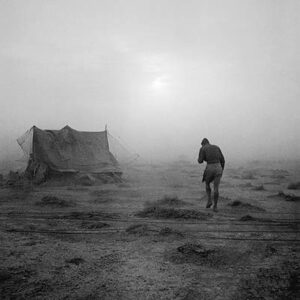
‘It was certainly a bleak picture for troops like that. And things got to servicemen who weren’t even abroad. On the Atherton tableland above Cairns, tens of thousands of troops in transit to the war in the islands, or back on home leave, were stationed at any one time, some of them for many months on end. Soldiers who were there told me that dog fancying, bred of boredom, began in this camp and flourished to such an extent that the general officer commanding issued an order ‘the practice of barking like a dog shall cease forthwith. Of course it didn’t, but simulated barking was only a minor element in the pandemonium that reverberated from the great rounded glass roof at Central Station one morning when I detrained. A foreign visitor would have seen all at once that all Australians were stark raving mad. Any of of our American allies would have characterised it as a SNAFU. Equally quickly any native son or daughter would have realized that the troops were just going through a regular routine of knocking those set in authority over them.
‘My father told me something about such a carnival of the animals, or one like it. News of it obviously travelled along the bush telegraph. Please continue. ’
‘No fewer than four long train troops were drawn up at different platforms at the same time. It was beyond the power of the officers to create order out of this primal chaos. Churned up to the point of apoplexy, they ran aimlessly about trying to restore order. ’
‘I’d have paid to see their faces, ’I said.
‘You’d have got your money’s worth. To mock their galloping officers but equally as true levelling Australians to mock themselves, hundreds of men baa-ed more loudly than a similar number of sheep ever managed to do. Hundreds more barked, whined and yelped like frenzied sheepdogs of a thousand different breeds. Some hooted, jumped in the air and waved their arms like rouseabouts trying to turn an unusually stupid mob of wethers. A few men even jumped in panic over purely imaginary obstacles as only sheep are doltish enough to do. As they wearied of this monkeyshining menagerie, the men disposed their duffle bags in knots on the platform, smoked fags , played cards and waited for those who were paid for it to sort out the mess. ’
Having been on a sheep station, delivering supplies with Dad, I was well aware of this purgative ritual, a perfect recreation of the atmosphere at morning smoko during the shearing season.
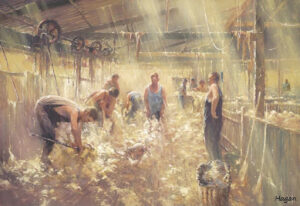
Starting the day with the bell ringing to start the shift, the men had gone into battle racing to bend over hour on hour repetitively removing fleeces.
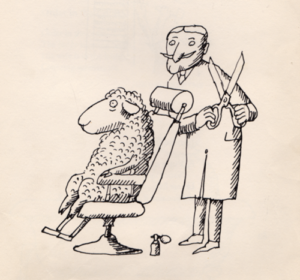
A blackboard showed the name of each sweat soaked shearer and the number of sheep he had shorn for the day. In between shifts there was the heat, boredom, loneliness and isolation the men had to endure as well as the constant struggle for recognition and respect for their union. Come smoko time it was not surprising for me to see them clowning around spraying each other with water, rolling around wrestling on the ground and dressing up and dancing with the sheep.
‘There was movement at the station,’said Russel.’
‘In explaining this behaviour,when the words pass around,are you a Freudian or a Jungian?’I asked him.
‘I find Reich’s ideas of interest. ’
‘And what do they say. Do tell me. ’
‘Whatever the cause of the neurosis, the psychotherapist is concerned with the patient’s ability to relax. Reich believes that the human orgasm is a major factor in physical and mental health.And that political and erotic repression share the same pathology. ’
That Party.
‘ You and your comrades were an integral part of our armed forces during the War, Russel. So why did the great fear and mistrust arise after the war?’I asked.
‘The Party had a strong base in the strategic metal and waterfront industries . It promoted a massive series of strikes in the steel, waterfront, rail and mining industries, demanding better living conditions. The coal miners downing tools, disastrously counter-productive, led to grave hardship and Chifley sending in the troops to move the coal. ’
‘Couldn’t Menzies have tried to combat it legally?’I asked.
‘He did. He tried twice to ban it. He came close to achieving this ambition, but was beaten by the judges of the High Court, and then by the Australian people in a referendum. The proposed ban brought to the fore considerations of fundamental civil rights. It would place the onus on anyone accused to prove he or she was not a Communist. While Menzies tried to sucker Australians into believing that Communism was ‘an international conspiracy against the democracies’, one that had to be fought militarily, Dr H. V. Evatt, the new Labor leader in June 1951 fought every inch of the way to convince people of the overriding importance of democracy. Evatt stressed that the Coalition government was attempting to stint freedom of speech and political association , victimizing one group in a manner which could easily be applied to any other group or individual it disapproved of. Nugget Coombs says his resistance was his greatest contribution to Australian history. However attitudes to Communism would continue to plague the Australian Labour Party. A Catholic anti-Communist faction, organized by Santamaria, splintered off in 1955 to form the Democratic Labour Party. ’
Careful, they might hear you.
‘This is where Australian Security Intelligence Agency came in, ’ Russel continued. ‘Spearheading the ideological dragnet to rein in suspected Communists and others considered to jeopardize Australia’s vulnerable national security..
‘Set up by Menzies, I suppose.’
‘Actually it was set up by the Chifley government. Evatt was in principle opposed to it on civil libertarian grounds. However once it was formed Doc wanted to make sure that it’s civilian nature was maintained. Once in office Menzies deliberately selected a director with a military background and approach. The smaller the Party became, the bigger the size of the apparatus to watch became . ’Carbuncles on the backside of the state’ I call it. Like Hoover, its head, the ‘Lord of the Files’ Brigadier Spry, sits on top of a mountain of carefully detailed information based on staking out, snooping, meddling, tailing, the planting of agents, a network of pimps and squealers, mail interception and phone tapping . ’
‘How did you sense such stickybeaking?’
‘You could tell when Big Brother was listening by the click and crackle on the line.’
‘At least you couldn’t complain to the government your voices weren’t actually being heard .’
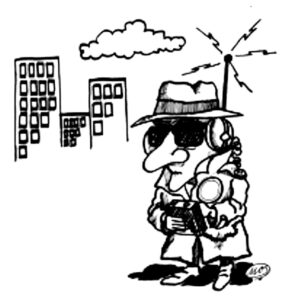
‘None of us were considered boring. We were all persons of interest. We could sense when they were tailing us.’
‘What were their tactics?’
‘A field agent would follow us from the opposite side of the street. They use shop windows as reflectors and good cover for stopping suddenly. ’
‘If you stop too. ’
‘Ding! Correct. ’
‘They must have known you knew they were around,”I said.
‘They stick like a tick. And as hard to shake off. When I’d return home with friends, I’d pound on the wall and yell ‘Testing! Testing! Testing! One! Two! Three! Am I coming in loud and clear?’
‘You’re not one to wear a tin hat or believe in poltergeists. Were you joking?’
‘Only half joking. Just because we were a bit paranoid doesn’t mean they weren’t after us . There was always a chance Big Brother was on us, listening in from behind the skirting boards . ’
‘So the walls had ears.’
‘They planted listening devices anywhere.’
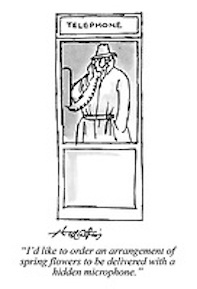
‘What were they playing at? Did these intrusions work?’ I asked.
‘It might seem a complete waste of time recording all these conversations but it enables them to build up a matrix of who knows who. And it helps them to discourage us-to frighten us off. It certainly slowed us down and stalled our momentum. They put the eyes on us, watching every little mannerism, jotting down notes on how we sit, stand, talk, eat and move. They noted all our visitors, who we met.’
‘Anyone in particular? Commissars, heroes of the soviet republics, general secretaries?
‘They went through our bins to reveal our sins. They looked for any dirty linen to damage our credibility. Anyone suspect they could have a hold over and use for blackmail. More often than not mistresses and homosexuals whose movements they’d unconstitutionally and reprehensibly bug, tape ,secretly photograph and memorialize.’
‘Did you ever spot them?’
‘You could see the pavement artists taking down the number plates of cars outside meetings or our homes. With some, they’d sweep the inside, have a dekko in our desks, ferret around for secret radio transmitters, microdots hidden in books, evidence of exploitable vices and those old Gestetners with which we hurriedly roneoed our pamphlets. They’d check our writing pads. If we wrote something down, we’d have to use a single sheet of paper on a hard surface before wiping the surface clear.That leaves no impression.’
‘They probably even looked for snow on your boots!’I joked.
‘With their mentality, nothing surprises me. They dug around in my small garden for God knows what. ’
‘They probably saw it as a Communist plot. ’
‘They’d even go through our rubbish. No job such as looking for weapons amongst peace activists was too pointless for them.
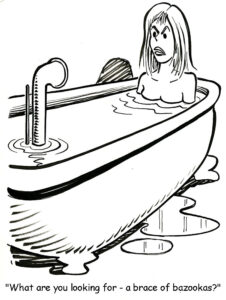
We were restricted and controlled. Made to pay. Even when it came to driving. Every stop, every U’y, every light—-. ’
‘—-It looked like you had company. ’
‘Their wheel artists were scoping every turn we made. Occasionally, when out walking, we’d see a car parked in an unusual place and veer away from the road, zigzagging in different directions, changing our pattern to lose any potential trail. We could spot them on park benches watching for brush passes and dead drops. We had to take circuitous routes to shake them off. ’
‘They weren’t entirely inconspicuous?’
‘They could give themselves away by any slip in their character or behaviour. They had to keep the right distance so as not to get noticed.
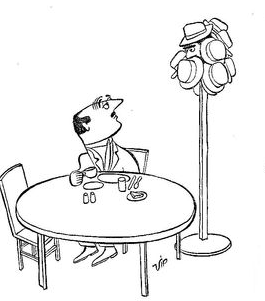
‘Close enough to learn something yet distant enough to keep their target at bay. ’
‘Correct. Some of us didn’t care.

However most of us took care not to let them know we knew. They could get too close up. Burned. I remember one day becoming aware of a guy in a sweaty suit and a needless raincoat that hung from his forearm. I had never spoken to him, yet his face was already familiar to me I had seen it the previous day, and for all I knew, the day before that as well. This particular day he was loitering near me in a hotel lobby . I could feel his interest in me. He was reading the ‘Sydney Morning Herald’. I strained my eyes out of curiosity to read the headline but couldn’t make it out. ‘You needed your glasses, Russel?’
‘No. He was holding the paper upside down. ’
‘Maybe he was putting out smoke?’I said referring to the agent’s tactic of making a showy display of his cover identity in order to give his cover legitimacy. ‘Maybe he wants you to think he’s not too well educated. ’
‘No, he really isn’t. Would anyone buy a used secret from this cack handed man? Someone so slow on the uptake. ’
‘Unfortunately it was us he and his masters slowed down. If I wanted to have a discussion I sometimes had to go and see the person personally, especially in a noisy, crowded street or open space where we couldn’t be recorded. Or in a church. ’
‘Why would you infidels meet in a house of God of all places?’
‘lt’s the one place no one ever goes. Alternatively I would ring them up on a public telephone and make the appointment to see them at a different place. ’
‘All this must have played heavily on your mind. ’
‘We made light of it. We referred to this invasion of our privacy with rhymes such as ‘I pry with my little spy’ and ‘I spry with my little eye’.
‘Your account of these objectionable sneaks and snitches reads like ‘The Spy Who Came In From The Cold. ’ It sounds like this shadowy hand knew more about you than you knew about yourselves’.
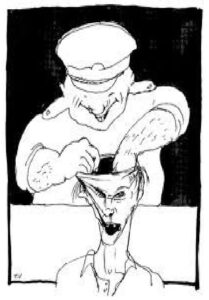
‘Their camera shutters clicking, they plotted our moves, tracing our personal lives right down to the nth degree. They knew when we were out.
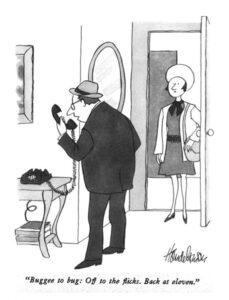
They know when we were in.
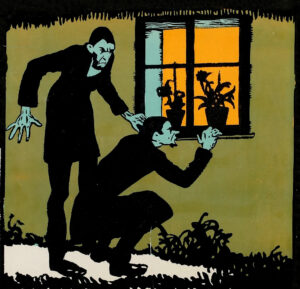
They knew where we were coming from. They knew where we’d been. They wanted to identify ‘established patterns of behaviour’. They itemised our lives in forensic detail. All about our very ordinary human motives to justify our sad little dossiers and our make-believe sins. They knew when I was doing some acting at the New Theatre in Sydney.
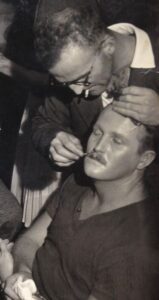
A gentleman introduced himself as Colonel In Charge Of Intelligence for the Sydney area. Accompanied by several heavily disguised mug coppers, they took notes diligently but introduced themselves not at all. ’
‘So did they end up with their finger on the pulse?’I asked.
‘You wouldn’t want to know where their finger had been.They raided our office and left it a total mess.
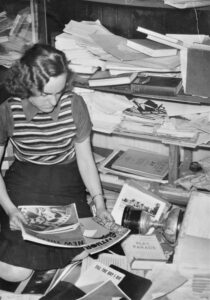
They banned us from playing agitprop in the Domain.One of our favourites was ‘The Miners Speak.’
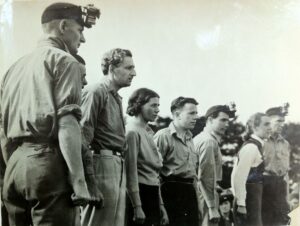
‘How did you answer such puerile philistinism? ‘
‘We cited the precedent of open-air performances by the Ancient Greeks and medieval miracle players.’
‘That would have gone over their heads, leaving them no wiser as to your thinking.’
‘They ended up-and still do- with some trifling, random observations of us. Knowledge about us that they could get by reading what we write. The rest is fanciful, voyeuristic fiction and insinuation. Gossip and factoid become fact. ’
‘Do you think there’s much of a deep dive in the reports they make on people?’
‘Most of their records are most likely about collating watch lists; lists of who we are with at protests, at work and even socially. It’s most likely about the lists and nothing about what people think or believe”.
‘How do they get into this line of work?’
‘It starts off innocently enough when they’re spotted. Often their recruiter ‘tunes into’ them casually at a party.’
‘I should imagine those with a knowledge of Russian and Chinese would be prize finds.’
‘You’d think so considering who they say they’re trying to understand .However in the mindset of the Organisation they’d be highly suspect. They’d include people like me who learned Russian.’
‘What happens to any interested parties after that?’
‘They’re given a phone number to call if they want an unspecified ‘job. ’
‘And after they’re inducted?”I asked.
‘Off the books, armed with surveillance and flim flammery, it’s operatives find themselves led into a maze of false trails, elaborate hoaxes, charades, facades, smoke and distorting mirrors. ’
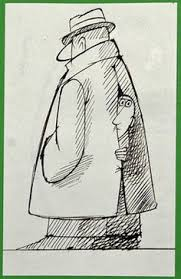
‘These will reflect badly on them. ’
‘Without a doubt. To understand where so many secrets, double-crosses and cross purposes lead, you need a blackboard and a slide rule. These deceptions are all packed with operatives soft enough in the head to lead themselves and each other on. They’ve been led to believe that although their work appears dishonourable, they’re doing it in an honourable way. That they’re our night watchmen doing good for their country which will save the world. That they’re the true expression of the nation’s subconscious. These little boys with a hero complex place their larcenous talent at the service of the state. They really believe in their schoolboy fantasies and bedtime stories, unable to distinguish between friend and foe, furphy and reality, dissent and treason, where nobody is who or what they seem. They end up believing that to betray is to be loyal. They equate humanism in its broadest sense with subversion in its narrowest. They become alive to the possibility that anyone could be a spy. They see ulterior motives- those of the KGB- behind everything we do. It couldn’t be about creating a better world.
At debriefing they are constantly being told there must be something else. Even simple things become part of the grand Communist conspiracy, it’s hidden hand everywhere. It doesn’t matter what it is. It doesn’t matter whether it’s true or not. The handlers feel it is better that they know everything they’ve seen or heard. Consequently the agents gild the lily to make themselves interesting and to feel they’re fulfilling what their handlers require.
The handlers then decide what to use or not to use. The whole bang lot of them can’t even trust each other. I hear one of them even shuffles his business cards before he gives them out. They might spy on each other if it’s suspected they’ve gone ‘bad’. They deal in doubt, not certainty. They destroy people’s lives on hunches, canards, smudges on a photograph.
They see themselves waging a war on the sly against a cunning enemy-us-. Security threats appear to be everywhere – from the highest office in the land to within ASIO itself. To deal with this their stratagem is they carry out ‘ spoiling’ operations’.These are designed to penetrate, disrupt and damage the political activities and personal lives of individual left-wing targets. ’
‘What do you see as such an operation?’
‘I’ll tell you about the grand daddy of them all. Menzies claimed in 1954 members of Evatt’s staff and their associates were part of a Soviet spy ring operating in Australia. At peak radio-listening time on the evening of the thirteenth of April, this master conjuror announced in parliament that Vladimir Petrov, third secretary of the Soviet Embassy in Canberra and self confessed Soviet secret service spy, had been granted asylum. He brought to ASIO a load of documents about the alleged ring. Menzies timing was perfect. Bert Evatt, leader of the Opposition was away in Sydney and there was in any case no time for questions or debate as members were leaving next morning to start working for the upcoming election. Backed by newspaper speculation, the scare served it’s immediate purpose, if only just. When the votes were counted, the Labour Party had won fractionally over fifty percent of the vote, but such was the gerrymander of electoral boundaries that Menzies was returned to office.
‘And that was the end of it?’
‘Menzies was not the man to leave it at that. Twelve days before the election a Royal Commission to sift the whole affair began sitting. In other civilised countries, on grounds of safeguarding national security, spy trials are usually conducted in camera. However the aim of this one was not to guard defence secrets but to discredit Her Majesty’s Loyal Opposition. Accordingly all sessions were held in the glare of maximum publicity. The atmosphere engendered was more reminiscent of that in a Moscow show trial than in a British court of justice. The performance went on for nearly a year during which over one hundred people were dragged through the witness box.
‘It sounds like‘prisoner’s dock’ is a more appropriate term. ’
‘The reputations of all were sullied, if only by reason of their appearance, and many emerged from the process besmirched for life. Yet when the farce ended, the three learned commissioners reported that no Australian citizen had commited any treasonable act punishable by law. ’
‘So what came out of all this?’
‘Ming’s real purpose had been amply achieved. When the show ended, the political credibility of the A. L. P. and it’s leader lay in ruins. Menzies and his party supporters have had us by the short and curlies ever since’.
‘ When will we ever dislodge immovable feature from our political landscape? Out of interest, were you called before the commission?’ I asked.
‘Fortunately not, though many new and old friends were. We sometimes had small bets on who would be next. Some of us felt guilty for not having been called into the firing line, but more often cravenly glad. But not so Bert Evatt who chose to thrust himself into the fray. Granted leave to appear, he charged that the whole inquisition was part of a plot by Menzies to tar him and his party. ’
‘Wouldn’t some see your use of the word ‘inquisition’ as showing some kind of a bias?’ I asked.
‘Only if they didn’t care to listen to what some of Menzies’ hand picked commissioners were saying, ’ he replied. ‘Cutting short one of Doc’s arguments, Mr Justice Ligertwood said astonishingly, before being stood down, ‘I do not care what the evidence shows, I will still believe the policeman. ’ When the question of the authenticity of certain of Petrov’s documents came up, Mr. Commissioner Philps said that even if Petrov stood up to swear that he had been lying all along, he [Philps] would still be certain the documents were genuine.
‘So ‘Doc’ was vindicated’, I said.
‘When the kangaroo court was over, the government lined up a kind of full dress post-mortem, parliamentary debate. Evatt was allocated two hours to open the subject. The evening before he was to speak, I was flattered to to be summoned to his room in Parliament House. The Doc had been the adjudicator of my inter-university debate I told you about. Two of his advisors and I were asked to closet ourselves in the room late into the night helping the Doc revise and polish the morrow’s great speech. When we dispersed we were satisfied that the speech was as good as it could possibly be.
‘And was it’?
‘When the time came and we and his closest supporters were gathered at a dinner to listen to his speech, he delivered the first few effective sentences we had worked over the night before. Then, deviating from what we had gone through, he inexplicably dropped a bombshell. Or one could say a Molotov cocktail. He announced he had communicated with the Soviet Foreign Minister to check whether the documents were genuine. There was a stunned silence amongst us listening as the House of Representative erupted in pandemonium. Government politicians launched such a barrage of interjections, jeers, catcalls, whistling and plain abuse, bawling out repeatedly ‘Molotov!’ so as to drown out practically everything Doc said in the time remaining. ’
‘ Being upfront and honest, he must have shot himself in the foot, ’I said.
‘When Doc arrived from the House to join us, he looked a bit wild-eyed and more dishevelled than usual. As he entered the room, I asked him why in heavens he had been so mad as to write to Molotov, and to announce the fact at the beginning of his speech.
‘Oh’, he replied easily, ’that’s established judicial practice. In opening a case, one must always ask counsel for the accused for his version of the events. ’
‘ ‘But couldn’t you see, ’ ‘I countered, more out of anguish than anger, ’ ‘that correct legal protocol was suicidal political insanity. ’
‘Did he?’I asked.
‘He couldn’t and I’m sure he never could. ’
What is the agency’s main daily concern these days?’
‘They direct themselves to rooting out those they see involved in mind control. Spry sees this new medium of television as the powerful tool that it is. ‘ Mr. Respectable Opinion” is concerned with ‘Communist propaganda’ in public debate, especially The A. B. C. We might be watching it now but nowhere as closely as his nibs and his agency . They’re keeping tabs on it as if their tinhorn lives stand on it. They’re worried about liberal ideas creeping in. They’re so narrow minded themselves, they can look through a keyhole with both eyes. They’re concerned about wily appointees cloaking their subversive political views, gradually placing their thumbs on the scales to change the tenor of the programs. ’
‘Why don’t they make their own programs?’
‘They do. They have their own special spin section for producing spin. ’
‘Spin ?’ I queried.
‘ It’s not the setting on a washing machine, or what you do in a dance move. It’s the propaganda which they salt the media with.
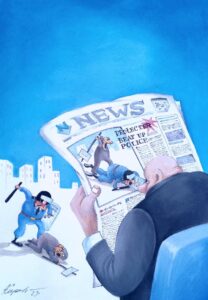
It aims at persuading public opinion against the Party with disingenuous, deceptive and highly manipulative interpretations of events. The agency has a special relationship with the newspaper owners and editors. With ASIO’s support, the government produces various films. Hoyts and Fox distribute them in their cinemas. ’
‘What in particular are they looking for in the ABC shows?’
‘They take umbrage at any talk of a more independent foreign policy stance, at ‘anti-British’ nationalism expressed in plays and programs on bushrangers and convicts. Such appointees are seen by You Know Who as pushing the view that the bushrangers were noble and brave and the police brutal, callous and craven.
‘Which respected writer would be so simplistic?’I said.
You’ve got to remember this paymaster only reads official reports and documents and listens to those it wants to. It recruits agents within broadcasters to tell on those of their colleagues it disapproves of. ’
“Yes sir, yes sir, three bags full sir”, I suggested. ‘Where do they get these proxies from?’
‘The talent spotting starts at our universities usually. Any likely candidates might get a tap on the shoulder from, for example, one of their tutors. ’
‘Lured by the prospects of gaining a modicum of power over others. ’
‘Step by step they are passed up the line, each flirtation leading to the next one. Following highly ritualized procedures, espousing clear codes of behavior, the espionage cabal, working secretly, offers protection and security to the deserving young man who can prove himself. ’
‘If it can be told, how does the agency work?’
‘It has the power to withold the all-important security clearance to existing or prospective ABC employees. In other words vetting. This system of security clearances covers not only the entire federal public service, including bodies like the CSIRO and ABC, but also the entry of migrants and those who wishes to become Australian citizens. The vetting of people in ‘key points’ -a defence term denoting installations ranging from the BHP steelworks to major dams- means that vetting extends to the state public services and even to private enterprise. ASIO then has at it’s fingertips when, where and to what degree those vetted have had contact with those it considers subversive. Then if you’re considered for appointment to a senior position, and they realize you’ve had contact with those they consider dangerous radicals, you can be excluded . Then after you get a new job ASIO often follows up and sees the manager. Soon after comes the sack. ’
‘Do we need this kind of surveillance? It degrades society and damages civil dignity to think there are people in your office or workshop watching you. How much damage does it do to people who are not a threat?How many mistakes are made, lives interfered with?’
‘Between you, me and the gatepost’, he said in mock secrecy, holding his index finger against his mouth, looking around to see if anyone was listening, ‘ You yourself can be double checked and given an adverse record when you go out teaching. The conservatives use ASIO as their own private research service. They’ll go through through your notes and doings with a fine tooth comb. Of course you’ll have Buckley’s chance establishing a causal connection between your political activity and any fallout from the Education Department. As you would expect they won’t readily disgorge their secrets. ’
I brought up the case of Bill White who, the previous year had been summarily dismissed from The Department of Education for his conscientious objection. ‘An unaligned teacher, he just believes the state cannot force anyone to kill others. ’
‘His record’s clean as a vestal virgin’s. Nevertheless the agency builds up records by chapter and verse on such persons of interest to them, ’continued Russel. ‘Influential Australians with left-wing views in the arts, academia and science can all be dossiered. Dark biographies written up where all suspects are considered guilty. In some cases ASIO can use hearsay second hand information to defile reputations and stifle careers. ’
‘The full treatment, it appears. You know an awful lot about these matters, Russel. ’
‘More than I would like to. ’
‘Were you affected personally?’
‘My appointment to the NSW University of Technology in 1956 was overturned. I believe it was because of ASIO’s “adverse” reports against me. The V. C. Philip Baxter, Professor of Chemical Engineering. informed the University Council, which acquiesced, that I had been ‘ active in seditious circles in Canberra‟. Although Baxter had fired the bullets, the nominal head of the newly named university of New South Wales was it’s Chancellor, the Chairman of the Public Service Board, which had presided over my forced departure from Wagga Teachers College. ASIO’s branches have recorded “adversely” on academics. Menzies tried to assure me that he and his people had put no oars into my affairs. I wasn’t sold. My past was catching up with me. Perhaps I should not have made so many neighbourly visits to Dr. Evatt. ’
‘Who were some other suspects I might know about?’, I asked.
‘ Because of the Party’s strength in the actor’s union, there was a stellar cast. It regarded the actor Peter Finch as an undercover Communist and placed acting icon Chips Rafferty under its spotlight’.
‘That’s ridiculous. These great actors are honoured for their military service. Why would someone like Peter have been targeted so?’
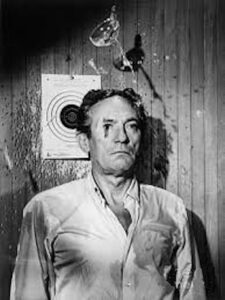
‘The spooks were drawing their longbow here. All Peter did was to hang around with the likes of me. He is a humanist with buddhist leanings. As for Chips all he did was to work with Peter. Mind you under a socialist director on a film celebrating an armed rebellion against the state.’
‘Eureka Stockade.’
‘The crackle of muskets at dawn heralding a legend was born.’
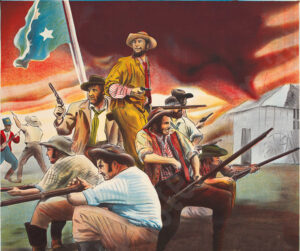
‘So, you might say I’ve been systematically indoctrinated by so-called Communists from a very tender age. ’I said. ’
‘ You still are. Consider our Vice Chancellor Zelman Cowen.’ He opposed the Communist Party dissolution referendum in 1951 and the Victorian hangings.He has urged that this country be less prominent in opposing United Nations membership for the People’s Republic of China, He has argued that judges should be more open in revealing the true reasons for their decisions.’
‘‘He is moderate politically and promotes even-tempered public and private discourse, disagreement without rancour.I would have thought he would be classed as a liberal reformer.’
‘You know that.I know that.So do his detractors.But they resent and suspect his deeply felt commitment to social justice .His numerous enthusiasms have taken him to the iconoclastic edge of the establishment whilst not far beyond its periphery. He serves this purpose with a circumspect non-controversial rectitude.This has all too often been regarded as the sine qua non of the gubernatorial role.’
‘And yet he made it into the files of ASIO?
‘ Zelman was placed in category D. This neatly included “all other persons recorded by ASIO about whom insufficient evidence is held to warrant placing in categories A, B or C”.
‘You’re joking’, I said.
‘It gets worse’, said Russel. ‘Every year A. S. I. O. supplies the government with lists of Australians it considers subversive, names to be interned in detention camps should a war with the Soviet Union or ‘national emergency’ break out.
‘ What the F. B. I. call the “Security Index, ’ I said.
‘Exactly. Those on it can be arrested without warrant, ’ he said, clamping a pair of his imaginary cuffs on me. ‘ Berkeley, home of the Free Speech Movement has the highest per capita number of people on it. ’
‘Surely we are safe from such threats. ’
‘A. S. I. O. has similar aims. It’s main purpose is to neutralize what it considers a potential “fifth column” once war breaks out and prevent anti-war sentiment from taking hold . ASIO’s role, as “the fourth arm of defence”, is to prepare the names, addresses, physical descriptions and other clues to assist the constabulary to arrest those it dobs in as soon as possible . ’
‘How could they do such a thing in a democracy?’
‘What else could we expect them to do what with their record? Declare a public holiday?’
‘The Cosssacks would be all around us waiting for the call. ’
‘It would be a blanket round up. They’ve painted the bullseye on their targets more thickly. They’ve broadened the definition of who is a ‘Communist’ , so that people who have simply inked petitions ot taken part in marches against the atom bomb are all lumped together holus bolus as security threats. ’
‘So to ASIO nothing is as it seems. ’
‘Their list of suspect front organisations ranges from film festivals and mothers clubs to the peace movement, the Teachers Federation, The World Council of Churches and the New Theatre. The difficulty for the ASIO cold warriors is they don’t know when subversion begins and where it ends. To do their coalition masters’ bidding , they peddle tittle-tattle on all kinds of innocent people. They hold out a sniff of a subversive in return for brownie points. They equate anybody who doesn’t play ball with the government as a potential danger. ’
‘Who for example?’
‘Take Tom Uren for example. He has been deeply involved in questioning and asking seeking details of the North West Cape communications facility in Western Australia. Our government doesn’t have to be informed when it is placed on alert. He argues that the base cedes Australian territory to a foreign power and makes us a nuclear target. It could receive a message from the President saying Fire!’ Our government would have as much control over such decisions as the U. S. Congress. ’
‘Zilch’, I said.
‘This invisible government can’t distinguish between dissent and disloyalty, let alone treason. Hand in glove with the coalition, Spry believes the opposition to this war is to promote civil war. ’ ‘It appears these agencies have ended up subverting the very democracy they are charged with protecting’.
‘A. S. I. O. rejected the decision of the High Court and the people not to outlaw the Communist Party. It responded by illegal measures-raiding Party premises scavenging for compromising evidence. It’s answerable for a litany of offences against our people’s democratic ideals and invasions of our privacy. ’
So we can’t trust our own government to protect our privacy?’
‘That would be like trusting a peeping tom to instal our window blinds. ’
‘It presumably argues it’s doing this to protect the nation’s security. ’
‘Spying is a matter of deceit and betrayal, no matter what the perceived justice of the cause for which it is done. I cannot think that espionage can be recommended as a technique for building an impressive civilization. It’s secret light puts out the light of the ordinary world. It’s a lout’s game in which the wide eyed and unaware are all too easily entrapped, a soul-crushing negation of the trust on which a true civilization is founded. ’
‘So how can they pull such a fast one? How do people go along with this self deception?’ I asked. ‘Why do politicians become so aroused by the espionage establishment?
Looking at the posters of Bond pinup girls on my walls,
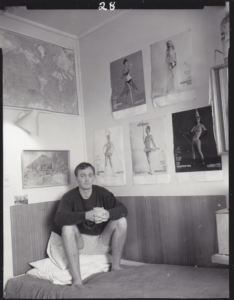
Russel said: ‘You could be forgiven for thinking of the spy as a byronic adventurer like the rakish 007 in all that spooky paperback stuff. Licensed to kill, tearing around in a fast car, blowing poison darts at the KGB in the Arab Quarter. Using whizzbang gadgetry and gimmickry to give the slip. Who, combining brutality with parody, caviar and champagne, is easy to separate from the bad guys, rescues beautiful women from the clutches of evil megalomaniacs and is seduced at cocktail parties. Dangling a skirt in front of a lusty young male is a high percentage play ’
‘What a way to go’, I thought. ‘These mata haris could give me their slip. ’
‘Caught undercover in a honey trap,’’I said. ‘Under the covers of the sheets.’
‘On a weekly basis the free world is saved by suave men from U. N. C. L. E., cheeky Avengers, Secret Agent Patrick McGoohan, the jaunty tennis bums of “I Spy,” or even — would you believe? — Maxwell Smart. Whatever that jolly crew of madcaps and bon vivants is fighting, it does not resemble the actual cold war. The war they’re engaged in is, at bottom, cultural. These swingers are seen to preserve Western democracy by making it seem like nonstop sexy fun, that being better looking, better dressed and more amusing than our enemies is sufficient to defeat them, ’
‘So who are the regular, real world spies?’
‘The usual operatives are people who fade into the crowd and no one remembers. In the spy world, anonymity rather than flamboyance is the key asset. Mr. Grey doesn’t jump away from fireballs, out of cars or womens’ beds. He spends his time at meetings, filling out reports, making sure everything is cleared and authorised. ’
‘Dullesville. ’
‘Well put. Like in ‘ The Spy Who Came in From the Cold’, a harsh corrective to the glamorous world of James Bond, Leamas’ is that of a drab world of smoky boozers, beating and bickering rain, the labour exchange and tinned tomato soup from the corner shop. A world where we see victims rather than heroes. ’
‘Burton’s spy describes himself as a plain, simple, muddled, fatheaded human being’, I said, ‘who sees all spies, on both sides, as scum, a bunch of seedy, squalid bastards like me’. “What do you think spies are’ , I quoted, having been drawn back to the book again and again: ‘priests, saints, martyrs? They’re a squalid procession of vain fools, traitors, too, yes; pansies, sadists and drunkards, people who who jump at any shadows on the wall, who play cowboys and Indians to brighten their rotten lives. ’ Understandably John le Carré’s unsparing depiction hasn’t won him fans among escapist popcorn munchers or many friends with his former colleagues in the espionage community.’
‘It’s not the apple polishing they would hope for. His espionage world is one where the only certainty is that things are seldom what they seem. It’s veneer of utter mundanity masks an interior of deception, treachery, betrayal, psychological manipulation and anger.’
‘It sounds a bIt like a blind boil in adolescence, swelling below the surface, poised to erupt.’
‘Yes, good spies are present but not noticeable. They are by nature secretive, devious and play head games; they lie, cheat, steal and kill. Moral ambiguity is built into the profession. ’
‘It’s a world as distorted and illusory as Lewis Carroll’s Wonderland. ’
‘Unlike with the brash antics and simplistic melodramatics of James Bond, operatives such as this cynical, chapfallen undercover one, never faraway from a bottle- and the only person he really cares for- can be subjected to some very dirty double-crosses and double-double crosses. Having risked his life for his country, ripe for cultivation by East German secret police as a potential defector, Leamas came to be regarded as an expendable chess piece. ’
‘No matter which side you’re on, espionage appears such a deeply dubious human activity. ’
‘As deep as a digital rectal exam,’I suggested.’
‘Those who are driven enough to enter the world of espionage are not-and can’t afford to be- driven by ideals. ’
‘Going down this rabbithole, ’I said, ‘you discover, it seems, there’s really little difference between the hunted and the hunter, between East and West. In this ambiguous world the very concept of the enemy becomes blurred: “Before, he was evil and my enemy; now, he is evil and my friend,” shrugs the desolate Leamas at another fateful twist. Giving as bad as they get, the only motive for agents after having entered is expediency. In this culture the end justifies the means. As his control in London tells him, “Our policies are peaceful, but our methods can’t afford to be less ruthless than those of the opposition.”’
‘ Yet it seems still that politicians -and journalists- go weak at the knees in the presence of men in dark glasses and trench coats. The smallest fart from them makes them bow when they should hold their nose. Kennedy was intrigued by the mystique of the Secret service and identified with them. The word is out that so mesmerised are courtiers by spooks that they buy anything they say without question. ’
‘Perhaps it is because everything is shrouded in secrecy that politicians feel anything in a dossier stamped “Top Secret” must be right, ’ I suggested.
‘There’s a certain frisson that comes with being let in on a secret, I’ll have you know.’
‘Of course,’I replied. ‘A secret is something only told to one person at a time.’
‘The biggest problem is the intelligence service is known to provide politicians and journos with information that has not been checked for accuracy and doesn’t hold water. To justify it’s existence there is a tendency for the service to believe what it wants to believe. The intelligence is worked to fit around political policy. It’s actually disinformation. They are not acting in any national interest, but their own sectional interest. Both Menzies and Spry blurred the lines of impartiality between ASIO and the government to the mutual benefit of both. This marriage of convenience ensures the dominance of the conservative coalition. ’
‘ So the intelligence services really behave like the criminals they are supposed to fight. ’
‘Belonging to them is a socially acceptable way of expressing criminal tendencies,” Russel said, ‘and, I might add, getting very well paid for it. A guy who has strong criminal tendencies-but is too much of a coward to be one-might wind up in a place like A. S. I. O. if he had the education. ’
‘Who is behind these people getting away with such gross breaches of our constutional rights?’I asked. ‘Who are the ultimate conpirators?
‘There are wheels within wheels and reality behind a complex web of appearances. Behind the state and federal governments, and behind the secret police organisations nominally responsible to them is a tiny privileged circle who rule. People never voted for them, don’t know their names. They remain quietly behind the scenes, generation after generation. From the corporate world, the media and a few politicians, it’s members are responsible to no-one but themselves. ’
‘I imagine they’re all respectable church men who go down on their knees on Sunday. ’
‘They’re men who keep the Sabbath, and everything else they can lay their hands on. ’
‘What about the Ten Commandments? Don’t they subscribe to these?’
‘They make up their own commandments. The first one:‘Get off others what you can for yourself ’. They never bore them down from any mountain top. In their worship of Mammon, what they say goes. ‘What kind of things do they say?’
‘Usually what they say matters less than how it is said. Their’s is boardroom banter, washroom plotting and country house politics – the art of the deal. ’
‘What are the conditions for membership?’
‘The sole condition is absolute secrecy. Members of this faceless corporate cabal swear never to divulge even the fact of their circle’s existence to anyone. These gnomes see their mission as to ensure continuity and stability in the carrige of the country, irrespective of the policy of the elected government of the day. They put their agents up to all kinds of devious acts. Politicians fear to incur their enemity. ’
‘And their agents?They’re in on the arrangement too, I suppose. ’
‘By virtue of holding positions of trust with public and private organizations,
they know many of the secrets that others in more powerful positions would rather be kept secret. For them success isn’t what you know or who you know but what you know about who you know. ’
‘They know where all the bodies are buried. ’
‘You might put it that way. they know all the secrets and intrigue from the past, all the relevant and hidden details. They can use that knowledge to protect themselves or to secure something of value for themselves. ’
‘What about the law? Where does that come into this?’
‘ These partners in crime see themselves as above the law. They don’t play by the rules. They move the goalposts when it suits them. ’
‘So this is a secret government beyond the control of the people
And accountable to no one. Why can’t most people work out these connections?’
‘The closer we are to discovering the connections, the more Parliament turns a blind eye.
‘We can’t talk about that in open session, ’ they say, ‘National security reasons. ’The truth lies dormant in their laps. They’re blind by choice. What we have is a conspiracy of silence. The entire Parliament is aware of the cabal and the fact that this is a national security state and less and less of a representative one. It’s a never ending story. By the time we get over one of their scares, get on with our lives and the memory fades, they spring another. Then it’s too late. It’s like the story of the frog in the pan of cold water. If you throw a frog into hot water, it’ll jump around and suffer greatly and die. If you put the frog in a pan of cold water, put that on the stove and heat it to boiling point, the frog doesn’t stir. He doesn’t feel it. He doesn’t notice it. In the end, he’s dead. These things happen incrementally. They’re gradual. ’

‘‘So it’s a process of normalisation, a slight, barely perceptible raising of the temperature so that people barely notice until they are actually boiling alive. I can’t wait for the day when we have a genuine democracy free of such manipulation, ’I said, ‘one that isn’t hollowed out. ’
‘Don’t we all. The way things are going, it doesn’t look likely in the near future. Sadly the fact of the matter is secret police spying organisations are probably with us to stay. The stars may change their course, the universe may go up in flames and the world crash around us but there’ll always be those with nothing better to do than stick their noses in other people’s private business. They are what they are. What can’t be cured has to be endured. So long as they exist, open, responsible, democratic government will be more or less deformed by hidden, capricious plots and pressures. ’
‘I hope you’re wrong, Russel. At least on this score. ’
‘Only time will tell, Allan. Only time will tell. ’
Time would tell that Russel was right. Today we know governments parading as democratic spy on their citizens on a massive scale.
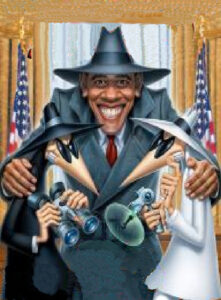
‘It seems they don’t want us to know about them but they need to have something on everyone else.’
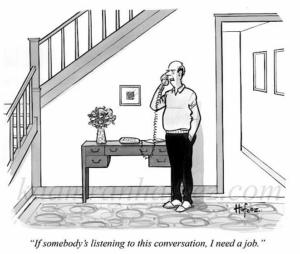
The powers of A. S. I. O. like it’s counterparts have expanded enormously. It’s got a huge new headquarters, bristling with antennae, barbed wire and high fencing all round. Scores of scattershot anti-terror laws have been enacted. It has the power to detain people in secret for up to a week. That person has no right to remain silent and refusal to answer questions is punishable by five years in jail. The detained person does not have to be told why they are being held. These are attacks on civil liberties hard won over hundreds of years.
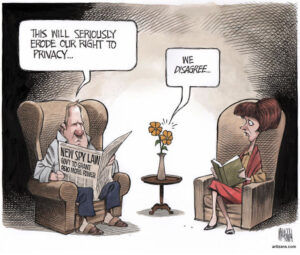
There is no doubt there are violent people out there but we already have ample laws to deal with them. Civil rights given away are hard to get back.
It used to be clear that the ruling classes had the wealth, authority and power while those underneath did not. This started to change when the right to appoint our rulers moved from the wallet to the ballot.
It seems clear that the state that backs domination of the rich over the poor, of the powerful over the weak, has well and truly exhausted it’s shameless colonialist form .It has turned inwards to oppress those within it’s borders. Now through the centaur state, a liberal head mounted upon an authoritarian body, the rich and powerful are doing everything they can to preserve their power.
This is why democratic rights and civil liberties are so important and essential. We must now preserve our right to speak, to assemble, to organise, to move around freely and protect our identity, and not become crushed by the state.
Dead in the Water.
On June 8, 1967, US Navy intelligence ship USS Liberty was approached and orbited on the high seas in international waters by two Israeli Mirage jet fighters.
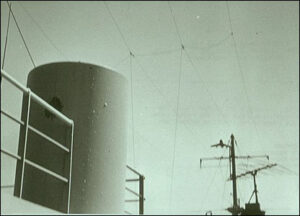
Suddenly it came under attack from the air and naval forces of Israel.
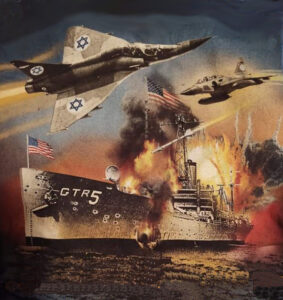
34 men on board died.
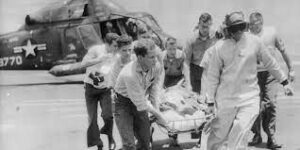
‘When it comes to bringing fire to bear, the Israelis can be as friendly as the Americans, ’I said to Russel.
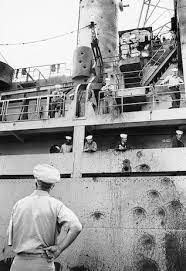
‘They certainly take liberties with them, ’ said Russel. ‘They may have been trying to put the blame on the Egyptians or Russians, goading the Americans into taking retaliatory action for them. ’
Looking up from the ‘Sydney Morning Herald’, he said ‘ Even Dean Rusk’s not satisfied with the Israeli explanation. He says that the outrageous sustained attack to disable and sink ‘Liberty’ ruled out an assault by accident or some trigger-happy local commander. Through diplomatic channels his department refuses to accept the Israeli explanations. He doesn’t believe them ‘.
‘Get out of here’, I said ironically, thinking about how much the U. S. accepts of Israel’s sincerity is a hit and miss affair.
‘Nor apparently do others including a number of crew members. They believe Israeli forces-who boast of their precision surgical style of killing- attacked with full knowledge that this was an American ship.
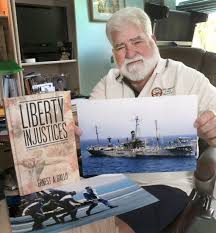
‘Accidentally on purpose’, I said.
‘Despite a near-universal consensus that the Israeli attack was made with full knowledge that USS Liberty was a US Navy ship, many accuse the Johnson administration began of a cover-up. They got the the facts first, then distorted them as they pleased. They are believed to be downplaying the attack to mollify the Israelis. ’
‘Isn’t the United States obligated to investigate the allegations in accordance with international law and treaties, ’I asked.
‘The pro-Israel lobby has launched loud, vicious ad hominem attacks on anyone who attempts to discuss the deliberateness of the attack. As to the facts of the case, they don’t want to go there. Instead, they rely on propaganda and charge anyone who questions the Israeli position with being anti-Semitic.’
‘This won’t go down well with American servicemen, ’I said.
‘ Anyone there who volunteers for military service effectively writes a blank cheque, payable to the United States of America for an amount up to and including their life. The United States, in turn, promises to spend these cheques responsibly. That bargain implicitly includes a promise by the United States to protect them and to seek retribution against anyone who harms them. In the case of USS Liberty, the United States has failed to keep its end of the bargain. This can only lower morale and voluntary recruitment.
‘ It shows they have a double standard’, he replied. ‘ Are you thinking what I’m thinking?’
‘Sure. One law for the Vietnamese and another for the Israelis. ’
Any Excuse Will Do.
By that time it turned out that the attack on American destroyers by the North Vietnamese in August 1964 never happened. There were no smoking guns. The apparent ‘ambush’, carried out not in international waters but in Vietnamese waters was a hoax. There had been nothing but ‘black waters and American firepower’. The White House misled people, fitting up the North Vietnamese to gain support for it’s homocidal policy in Vietnam.
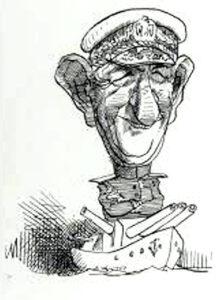 Johnson twisted the facts, painting Ho Chi Minh as the aggressor and putting the U. S. into a more acceptable defensive posture – in effect giving to make war. This retaliation waiting for something to happen provided the US with a pretext for a carte blanche escalation of warfare against Vietnam. Johnson, who saw the war in more crude and simplistic communist vs. anti-communist terms than Kennedy, insisted that the bombing would end the war.
Johnson twisted the facts, painting Ho Chi Minh as the aggressor and putting the U. S. into a more acceptable defensive posture – in effect giving to make war. This retaliation waiting for something to happen provided the US with a pretext for a carte blanche escalation of warfare against Vietnam. Johnson, who saw the war in more crude and simplistic communist vs. anti-communist terms than Kennedy, insisted that the bombing would end the war.
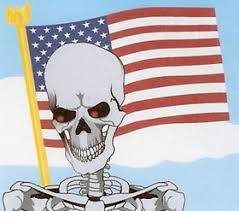
Few progressive representatives opposed it. It just so happens that even Senator William Fulbright the outspoken Democratic administration insider went along with the Tonkin Resolution initially . At the Presidents request, Mr. Fulbright introduced a resolution approving the bombing of North Vietnam .
The Reign of Wayne.
Wayne Morse was one of only two senators to break ranks with the party leadership and vote against the Gulf of Tonkin Resolution. This authorized bombing of such sites as the Ho Chi Minh Trail. Immediately after the resolution was read and presented to Congress, Wayne began to fight it. He contended in speeches on the Hill that the actions taken by the United States were actions outside of the constitution and were “acts of war rather than acts of defense.” He had a prophetic ability to foresee the outcome of the war. A lone voice in the wilderness, his soothsaying stand brings to mind the lonely one of Senator Byrd who opposed the equally misbegotten degrading war on Iraq based on the pretext of ‘weapons of mass destruction’.
As early as 1966 Senator Morse told a student union he would like to see protests such as those that were taking place to multiply by the hundreds across the country. He called out the President unrelentingly on the war. He wrote “as long as I serve on the job I am going to serve my own master under obligation to no one”. No one would ride roughshod over him. He appreciated my encouragement.
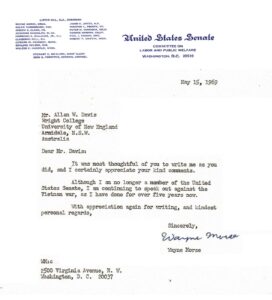
A Coterie of Doves
In 1968 Clark Clifford, as US Secretary of Defense publicly called for an end to American involvement in the war against Vietnam and a halt to the bombing of the north. Mr. Clifford thanked me for my encouragement.
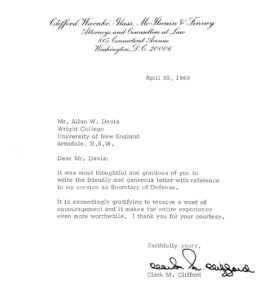
Before his acceptance of this position, Clifford had serious doubts about the wisdom of ramping up this war. He understood that it was it was motivated by the need to save face rather than by any strategic considerations.
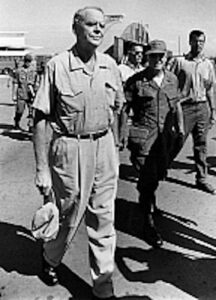
In the summer of 1965 Clifford, with the ear of the president, had warned him against escalation.
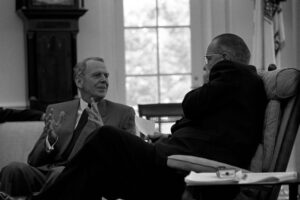
He wrote to LBJ that it could be a “quagmire’, a ‘bottomless pit’ in which ‘we could be there year after year, sacrificing tens of thousand of Americans a year and it just didn’t add up”.
As they were dragged further down, he was joined by Senator Fulbright who came to believe that he had been put on. “The biggest lesson I learned from Vietnam, ’ he said later, ‘is not to trust government statements. I had no idea until then that you could not rely on government statements”.
How could presidents who are nominally big white chief of the military brass find it so difficult to bend it to their will?
Seated at the coffin-shaped table in the Cabinet Room of the White House, Clifford had realized the presidents and officials who were nominally in charge of the war had much less control than they thought they did. Kennedy and Johnson did what the top brass recommended, but because in doing less than it called for, they felt they were being temperate, cautious. There was the chimera that they had held it off, whereas in reality they were steering us deeper into the quagmire. Forces had not been extricated when a contingent of 600 men there had run into the sand, and now they were escalating that commitment greatly , which meant that any future decision on withdrawal would be that much more difficult. And they were escalating not just the troop figure but changing a far more subtle thing as well. Whereas there had been a relatively low level of verbal commitment—speeches, press conferences, slogans, fine words—their administrations would now have to escalate the rhetoric considerably to justify the increased aid, Also by the same token, they were guaranteeing that an even greater anti-Communist public relations campaign would be needed in Vietnam to justify the greater commitment.
In feeding the beast they were expanding the cycle of American interest and involvement in ways they did not know. While the presidents had the illusion they were holding off the top brass, the reality was that they had let it in.
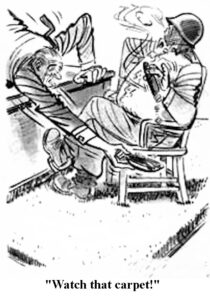
The military leaders now began to dominate the official reporting, so that the dispatches which came into Washington were coloured through their eyes. Now they were players, men who had a seat at the poker table; they would now, on any potential dovish move, have to be dealt with. The Presidents had activated them, and yet at the same time had given them so precious little that they could always tell their friends that their pleas had been rejected, that they hadn’t ever been allowed to do what they really wanted. Dealing with the military, once their foot was in the door, both Kennedy and Johnson would learn, was an awesome thing.
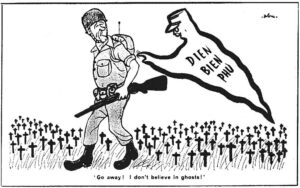
The failure of their guesstimates along the way, point by point, meant nothing. It did not follow, as one might expect, that their credibility was undercut and that there was now less pressure from them, but the reverse. It meant that there would be an inexorable pressure for more—more men, more hardware, more targets—and that with the military, short of nuclear weapons, the due bills went only one way, civilian to military. Thus one of the lessons for civilians who thought they could run small wars with great control was that to harness the military, you had to harness them to the hilt; that once in, even partially, everything began to work in their favour.
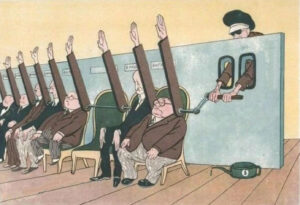
After his pragmatic acceptance of the position in 1968 Clifford concluded that the US had no viable plan to win the war-only for defeat avoidance. As the war against the war intensified, pitting classes and generations against one another, spreading distrust of political leaders, Clifford called for negotiations with the Hanoi government. He told LBJ ‘We are in a war we cannot win. ’
He made up his mind to try to get the US out of the war. He turned down a request by General Westmoreland for extra troops.
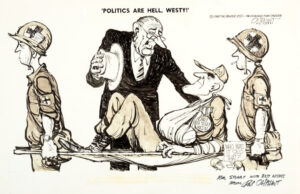
He provided the ‘wise men’- Congressmen and officials of like mind- enough clout to get through to the President. “It was like being in a John Ford movie, recalls Harry McPherson, Johnson’s chief speechwriter and amanuensis. “It was like the cavalry rode in”.
Clifford would use all his guile, intellect and charm in his campaigning for change. One ploy he used was for Johnson to have a dinner for a group of hardliners who he knew were softening their stance on prosecuting the war. He steered Johnson towards an announcement on March 31, 1968 that the US would halt all bombing and propose peace talks. They began in Paris in mid May 1968. He encouraged the Soviet Union to enter arms control talks. He often said he was haunted by a remark Winston Churchill had made about the superpowers and the arms race: “All they’re going to do is make the bubble bounce”.
He was the single most powerful catalyst of change to Johnson’s policy.
After leaving office, he clarified his apostasy in the July 1969 issue of Foreign Affairs. “Nothing we might do could be so beneficial as to begin to withdraw our combat troops. Moreover we cannot realistically expect to achieve anything more through our military force, and the time has come to begin to disengage. That was my final conclusion as I left the Pentagon”. He would refer to the war as ‘that wretched conflict’ and reversing the policy on it as the most gratifying experience he ever had.
The obdurate teflon coated Rusk had betrayed his better instincts and become a national pariah.
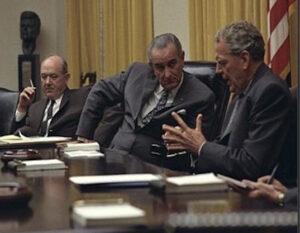
Unlike him Clifford refused to pass the buck, regretting his earlier compliance: “I was part of the generation that I hold responsible for our country getting into that war”, he said “I should have reached the conclusion earlier that our participation in that war was at a dead end”. He went on to add: “I permitted myself to be lulled into a false sense of optimism over reports that came back from Vietnam”.
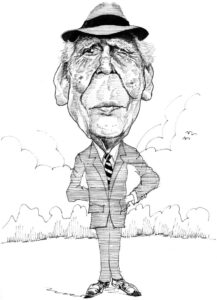
Like most people I was in a better position than he was to reach that conclusion. Outside the isolating bubble, more exposed to naysaying, free of the filtering influence of advisors and flunkys there who put a positive spin on reports and blocked out bad news. What was “true” depended in large part what fairy tales senior satraps, their careers depending on optimism, wished to hear. More and more caught up in what they believed were their own truths but which many, many others increasingly saw as self-deceptions, delusions and evasions. Men who should have known better patently refused to consider unconventional thought, and displayed a startling ignorance of history. Off base, in over their heads, struggling to shake off the trap, it only got them more firmly stuck. More and more isolated. Seeing those who wished them well but dissented from them on this issue not as friendly but reluctant critics, but as sworn enemies. There remained nobody there to say, “Boys, just take it down a bit. Just step back. Is this sensible? Isn’t to hold that the Vietnamese are going to rush up and embrace our troops when we blast the hell out of their country straining credulity to the limit.?”
I found it didn’t necessarily matter who made the decisions as about the groupthink behind the decisions itself. The trap was not the situation in Vietnam, but a manichean system of thought, influenced by World War II and the embryonic years of the Cold War. Crises, imminent dangers, and threats to the nation’s security and vital interests became intrinsic to foreign policy. In this context, reality would have scant place and the images of perils would be of the essence. In this schema preconceived ideas or interests determined and continue to determine how the world is portrayed, and the outcome is disastrous if only because action frequently bears scant relation to reality. Political leaders, indeed, themselves come to believe illusions as facts fall to the wayside, replaced by deliberate exaggerations, if not outright falsehoods. We were reminded constantly that the Soviet Union was ahead of the United States in every military capacity. We never were. In all this time, we were always ahead. But we were always the underdog in our own mind.
Another in a series of locales to be painted in the most foreboding global terms, Vietnam was merely the one where the inherent fallacy of American policy was exposed. We didn’t get stuck in Vietnam when we sent in combat troops, or we started bombing North Vietnam, or when we deposed Diem. The seeds of tragedy were planted when China went Communist in 1949. Truman was expected to fall on his sword for ‘losing’ China. The confected outrage gave ammunition to “Tail Gunner” Joe McCarthy and helped launch his career. Backroom boys in the state department, who were generally only guilty of being accurate on Asia, were forced from their career. France’s troubles in Indochina, which were previously viewed as a revolutionary struggle against colonialism, were recast as part of a struggle against the ‘red’ threat by what has been generously called the Free World. The consequences of this system of thought all contributed to, and in a certain way led inevitably toward the eventual tragedy. It continues until this day despite the disappearance of the Soviet bloc. You can imagine the politics and events in the Middle East following some of the same patterns. The names have changed, but…